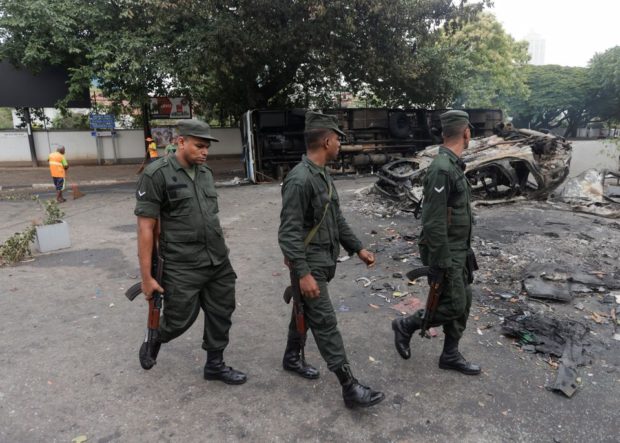Sri Lanka calls for new government a day after clashes kill eight

Army soldiers walk past damaged vehicles of Sri Lanka’s ruling party supporters after they were set on fire during a clash of pro and anti-government demonstrators near the Prime Minister’s official residence, amid the country’s economic crisis, in Colombo, Sri Lanka, May 10, 2022. REUTERS
COLOMBO — Protesters and a key trade group in Sri Lanka called for a new government to take control of the crisis-hit country on Tuesday while the president asked for calm following clashes that claimed eight lives and prompted his brother to quit as prime minister.
Sri Lanka has been suffering its worst economic crisis in history, with a severe shortage of foreign exchange stalling essential imports, including drugs and fuel.
For months, its tottering economy has been largely supported by India, which has provided assistance of more than $3.5 billion as the country began much-delayed talks with the International Monetary Fund (IMF) for a rescue package and also sought help from China.
China and India have long jostled for influence over Sri Lanka, a strategically located island situated off the southern tip of India with a population of 22 million people.
But the public’s patience ran out on Monday after ruling party supporters attacked an anti-government protest camp in the commercial capital Colombo, triggering a bout of clashes in which eight people died and more than 200 were injured.
Article continues after this advertisementHours after the violence erupted, Prime Minister Mahinda Rajapaksa resigned in the hope of forming a unity government and the police imposed a nationwide curfew until 7 a.m. on Wednesday. The country’s Cabinet stepped down.
Article continues after this advertisementProtesters angered by persistent shortages of fuel, cooking gas and electricity defied the curfew to attack government figures, setting ablaze homes, shops and businesses belonging to ruling party lawmakers and provincial politicians.
President Gotabaya Rajapaksa, the former prime minister’s younger brother, urged an end to the violence and his government outlined broad powers for the military and police to detain and question people without arrest warrants.
“All efforts will be made to restore political stability through consensus, within constitutional mandate & to resolve economic crisis,” the president said in a tweet.
IMF Sri Lanka mission chief Masahiro Nozaki said that virtual technical talks with Sri Lankan officials over a loan package that started on Monday would continue “so as to be fully prepared for policy discussions once a new government has been formed.”
Nozaki said in a statement that he was concerned about rising violence in the island country but remained “committed to assist Sri Lanka in line with the IMF’s policies.”
Shooting orders
The country’s defence ministry ordered troops to shoot at any persons damaging public property or threatening lives.
But protesters continued rallying for the president to quit, including at the “Gota Go Gama” tent village that was attacked by ruling party supporters on Tuesday.
“Now the whole island is supporting us,” said Lahiru Fernando, 36, who has camped at the anti-government protest site for weeks. “They kicked the wrong generation.”
Some experts said that if the president decides to step down in the face of growing pressure, the constitution outlines provisions for parliament to vote in a new leader.
“So, there will not be a power vacuum. There are also provisions for parliamentarians to appoint an interim government,” said Bhavani Fonseka, a senior researcher at the Centre for Policy Alternatives think tank.
The Joint Apparel Association Forum, which represents the Sri Lanka’s economically vital apparel industry, appealed for political stability in Sri Lanka, where the government imposed a state of emergency late last week.
“It is critical that a new government be appointed urgently to fill the current political vacuum,” the forum said in a statement.
U.S. State Department spokesperson Ned Price told reporters Washington was concerned by the deployment of the military and said the United States was deeply concerned about reports of violence against peaceful protesters.
Price called for a full investigation, arrest and prosecution of anyone instigating and involved in acts of violence and urged the government to address the Sri Lankan people’s discontent.
“We stress that peaceful protesters should never be subject to violence or intimidation, whether that’s on the part of the military force or civilian union units,” he said.
Day of violence
The attacks on government figures were in apparent reprisal for an incident just hours before the prime minister’s resignation.
The prime minister spoke to hundreds of supporters gathered at his official residence on Monday following reports he was considering stepping down.
After his remarks, many of them, some armed with iron bars, stormed a camp of those protesting against the government, beating them and setting fire to their tents.
Police fired water cannon and tear gas to disperse the skirmishers, after having initially done little to hold back the government supporters, according to Reuters witnesses.
Thousands streamed into the streets in celebration after Rajapaksa’s resignation, but the mood quickly became tense.
Protesters tried to tear down the gates of Temple Trees, his residence in the centre of Colombo, where broken glass and discarded footwear littered the surrounding streets on Tuesday, after some of the night’s worst clashes.
Military troops patrolled the area, where eight torched vehicles lay partially submerged in a lake. Discarded files and smashed equipment littered the ransacked offices of government officials.
In all, a police statement said 38 houses and 47 vehicles were set on fire across the country.
RELATED STORIES
Sri Lanka prime minister resigns, curfew imposed after clashes
Sri Lanka declares state of emergency amid unrest over economic woes
10-hour power cuts in Sri Lanka as crisis worsens